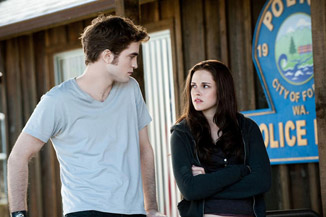|
|
Book Vs. Movie: EclipseBy Russ BickerstaffJuly 1, 2010
Possibly the single most potent improvement from book to screen has to be the werewolves. With little to no decent description off the interaction between the members of the pack, they came across as minor supporting players. Even Jacob, though clearly a major source of stress, seemed more like an event than an actual person in the text of the novel. The film opens things up considerably, giving the werewolves a potently vivid visual reality. True, they were clearly CGI creations, but the animators gave them a humanity that felt very real and visceral. And as they were paired-off against monsters who have been largely over-exposed in movies over the course of the past 20 years, it was difficult not to find them much more interesting than the vampires that were supposed to be the center of the film. Slade and company do a remarkably good job of integrating them into the action. The big fight at the end with a bunch of random vampires would’ve been catastrophically boring without well-placed, well-choreographed CGI wolves in the fray. As nice as it is to see vampires and werewolves fighting together onscreen, the film still suffers from the central problems inherent in the novel. At its heart, this is a romance and if the romance isn’t compelling, the movie as a whole feels like a bit of a waste of time. Robert Pattinson has come a long way as Edward Cullen, but he still comes across as a pale James Dean with fangs - a perverted, overgrown Eddie Munster who has fallen in love with a piece of food. The source material doesn’t give him any easy challenges. The character simply doesn’t behave the way one would expect a nearly invincible 100-year-old man to be behaving. Kristen Stewart is as compelling as ever, but the character she’s playing isn’t. She tumbles through the story by supernatural forces that seem to obsess over her. While she may be one of the two main characters, functionally, she’s a plot device with no real control over the world she finds herself in. Stewart seems to be a talented actress, but it’s very difficult to make the role of perpetual victim seem terribly interesting. Taylor Lautner manages to make kind of an unlikeable character in the novel come across with considerable charm, but the plot Meyer places him in doesn’t give him very much to do. The Verdict Stephenie Meyer’s series had lost quite a bit of speed by the time it hit the third novel. Its success is more a product of cumulative fan support than anything intrinsically interesting about the story. The product of much more than one person, the film series seems to have had the right mixture of talent over the course of the past several years to keep it fresh every time. The problem is that the plot of the third novel doesn’t broaden the appeal of the story to more people. Grounded as it is in specifics established in the first two parts of the series, Eclipse may have more of a fan-exclusive appeal. It is unlikely that the third film will do any better than the second. The development of the series over time is lost on an audience that will love the films unconditionally regardless. It is an audience unlikely to appreciate all the efforts by cast and crew to make the story that much more engrossing to anyone not already in love with the story. This is a pity, as the story isn’t terribly good and there really is some interesting work being done here in an effort to make it appealing.
[ View other columns by Russ Bickerstaff ]
[ View other Book vs. Movie columns ]
[ Email this column ]
|

|
|
|

|
Friday, November 1, 2024
© 2024 Box Office Prophets, a division of One Of Us, Inc.


